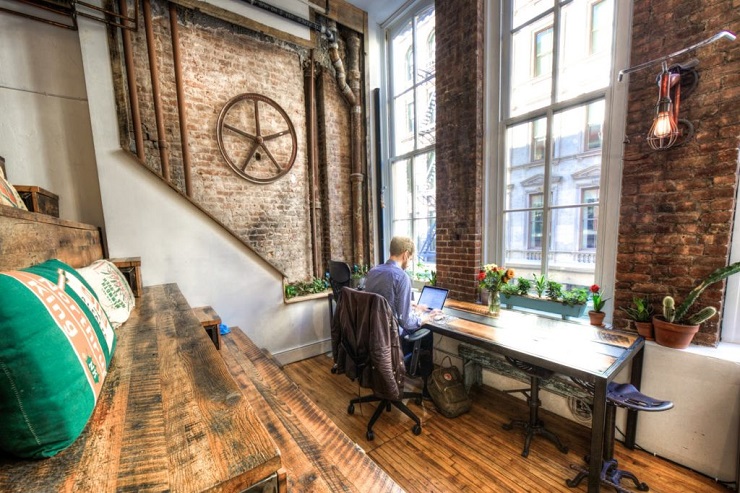As a founder, your choice of office space has a much bigger impact on the opportunities and support your startup receives than you might expect. While many of us begin working at home, there comes a time to leave the basement or garage—and that next step can determine your company’s trajectory for success.
While the home office may seem like a cost-effective solution with minimal rent and zero commuting hours, it can also lack the air of professionalism and amenities your business needs.
So you could decide to fork out for a dedicated office space. And while this option will give you the facilities and space you need, you are potentially locking yourself into an expensive and inflexible rental agreement.
Coworking spaces, incubators, and accelerators offer founders a middle ground. You can choose to use such spaces as you need to, while still gaining access to those all-important business amenities and opportunities that a private office cannot offer.
Coworking Spaces, Accelerators, and Incubators: What Are They?
Image courtesy of The Farm Coworking.
There’s often some confusion around these three broad categories and what exactly they can offer your business. So let’s start with some definitions.
Coworking Spaces
There are an estimated 14,000 coworking spaces around the world. NYC-based The Farm Coworking defines such spaces as, “a community of like-minded individuals who work together in the same space to collaborate and grow.”
If you sign up to a coworking space, you can usually choose to work from a hotdesk, dedicated desk, or a private coworking office that you can rent as and when you need to. A hotdesk means you are allocated (or choose) a desk at random on a day-by-day basis. A dedicated desk means you get to return to the same desk (there are usually lockers and other storage options so you can squirrel away your belongings). A private office is your very own room with a desk or desks depending on the size of your team.
Coworking spaces differ wildly in terms of the space available, size, and amenities you’ll get as a founder. You’ll most likely share this space with a varied mix of people, including freelancers, small businesses, and remote workers. Some spaces work hard to cultivate a strong community, while others are more interested in bums in seats.
When it comes to coworking spaces, freedom is the name of the game. The good news is that you don’t need to offer any equity in your business to use one. You can rent more space as your startup grows. And you can use a coworking space for as long as you need to (incubators and accelerators tend to run short three-to-six-month programs).
On the flip side, coworking spaces do not have such a laser-sharp focus on the startup world, compared to accelerators and incubators. However, many coworking spaces do offer advice and mentorship to startups through dedicated services, events, and networking sessions. Some also bring investors in for funding rounds and mentorship.
Simply put, coworking spaces are a mixed bunch. Each one is different in its approach to community, space, and the startup sector. Make sure you talk to a space’s community manager and take a tour before you sign up.
Key takeaway: You don’t need to give up equity to work in a coworking space, but you may miss out on mentorship and funding opportunities.
Business Incubators
A business incubator (sometimes known as a startup lab) is for new and early-stage startups, and places a core focus on mentorship to ready your business for growth. They are usually run by industry-specific companies and groups that offer businesses the support, expertise, and tools to succeed as a business.
One study claimed incubators represent the “best value” in terms of economic development for new businesses, due to a high ROI and low program costs.
The best startup incubators are notoriously selective and only tend to accept members who are in the earliest stages of setting up their businesses. When you apply, you’ll have to disclose your business plan during the selection process. And if you’re successful, you’ll be closely monitored and directed by experienced founders.
Business incubator memberships typically last between three and six months, although many do not run on a set schedule, as the focus is to nurture a startup in its very early stages of growth. When you do graduate from an incubator, you’ll generally be asked to participate in a “demo day” and pitch your startup for investment.
There are some independent startup incubators, but they can also be sponsored or run by VC firms, large organizations, or government entities.
If you work with an incubator, you’ll probably be asked to relocate to work with the mentors and companies in the program. Most incubators also run coworking spaces or offer a shared office space for members during their tenure.
Incubators will also take a share of equity in your business, and this percentage differs between incubators.
The Idealab is the longest-running tech incubator. It’s produced more than 150 companies since it set up in 1996, including more than 45 IPOs and acquisitions.
Australia’s Cicada Innovations asks for 5% equity in advanced technology startups, in exchange for access to a dedicated team of business mentors and a network of other entrepreneurs. It’s raised $264 million in capital since 2006 and its top five companies are worth a combined $300 million.
Key takeaway: While you’ll have to give up a share of your equity, business incubators can help springboard your business through mentorship and funding opportunities.

Business Accelerators
Business accelerators are intensive programs for founders, where you will usually be given a small seed investment and access to a large mentor network that you work with to build out your business. Accelerators, however, work with more developed companies than incubators. Early-stage companies would fit better at an incubator.
At the end of such accelerator schemes, you’ll most likely pitch your business alongside the accelerator’s other members to investors and the media at a demo day, much like at an incubator.
Silicon Valley’s Y Combinator is, arguably, the most successful and famous accelerator out there, and asks for 7% of your business’s equity. Companies including Dropbox, Reddit, and Airbnb are all alumni, and since 2005 YC has funded almost 1,500 startups with a combined valuation of $8 billion. It invests a small amount of money ($120,000) in a large number of startups, usually around 100, every six months.
The Techstars accelerator runs a three-month program and gives its members $100,000 worth of funding, along with office space and 400 perks worth $1 million. There’s also an Equity Back Guarantee where you have three business days to lower or eliminate Techstars’ equity position if you’re not satisfied with its value at the end of the program.
Competition is tough in the accelerator space. For example, Y Combinator reportedly only accepts 2% of the applications it receives and Techstars only hands out 10 spots from around 1,000 applications.
Key takeaway: Accelerators are highly competitive programs to streamline an established business model and get you ready for extensive expansion.
A Quick Note on Accelerators vs. Incubators
Accelerators and incubators both aim to help you grow your business through guidance, mentorship, and funding opportunities. As a result, there’s often some confusion about the differences between the two, but it all comes down to the maturity of your business.
Key takeaway: While both offer mentorship and funding opportunities, incubators target very early stage startups and accelerators are for more developed businesses.
Another key difference is in the way accelerators and incubators are structured. Accelerator programs tend to have intense timeframes of a few weeks or months, whereas incubators are more relaxed with their timelines.
Which One Should You Choose?
The choice between a coworking space, incubator, or accelerator depends on what your business needs now, and how you intend to grow your business in the years ahead. We spoke to a few fellow founders to find out which option, or combination of options worked for them.
“Coworking spaces give flexibility and space in the early days.”
Before you hand over equity in your business to an accelerator or an incubator, you may want to work from a coworking space, because of the flexibility of such spaces. In a coworking space you can, most likely, extend your reach in the startup community, meet other founders, and grow your business at a less pressured pace.
Elliot James and Dalton Tracee are founders of Pure Apartment Locating & Design and they use the atx FACTORY coworking space on the East Side of Austin, Texas. They chose a coworking space over an incubator or accelerator for the sense of community, collaboration opportunities with other businesses, and because the environment was in tune with their creative potential. “It’s been the best decision we ever made for our business,” they added.
And, because there is no stringent application process, you can pretty much work in any coworking space you want to. Plus, there’s no need to relocate.
“Coworking spaces foster collaboration with fellow founders.”
The competitive nature of business accelerators and incubators, coupled with the intensive timescales you have to work under, is very different from a coworking space, where you are encouraged to network and interact with your fellow workers.
This is a double-edged sword. While some founders prefer the privacy and focused environments of accelerator/incubator programs, others benefit from the collaborative nature of coworking spaces.
For example, Mark Valderrama, founder of SEO company Velvet Cloud, left his home office and, despite considering accelerators and incubators, decided on a coworking space as he wanted to work in a “tight knit community” with a range of businesses across multiple sectors and verticals.
Yasmin Mattox, founder and CEO at working women’s support startup Arkatecht, is currently weighing the benefits of coworking, incubators, and accelerators. She said her high-tech business would benefit from interdisciplinary collaboration with low-tech companies, because innovation is not limited to one sector.
“In that respect, coworking space looks like it just may be the winner, but I think there’s an underlying argument to be made for a hybrid offering I have yet to find that brings together people from various fields in a way that can also support high tech and all of the tech ventures in between,” she added.
“The mentorship at accelerators and incubators cannot be beaten.”
Accelerators and incubators can give your business the short, sharp shock it needs to grow, by connecting you with a core community of mentors and investors in a way that coworking spaces cannot.
While coworking spaces attract diverse mixtures of freelancers, flexible workers, and startups, you will be guaranteed to meet with some of the industry’s leading mentors and investors in either an incubator or accelerator.
This will, consequently, help you build a reputation in the industry, as well as access to vital business resources. For example, Trey Gordner, founder of library marketing startup Koios, recently relocated from Columbia to Washington and chose the 1776 incubator over the area’s coworking spaces for its “connections, community and cost.”
“Keep an eye on your equity.”
Of course, access to such high-level contacts comes at a cost, and business accelerators and incubators will ask for a cut of equity and (usually) charge you an introductory fee to take you under their wing.
There is always a trade off, according to Claire McTaggart, founder at HR tech startup SquarePeg, and you need to work out what value such programs can deliver to your business, compared to the value you could generate if you went it alone.
It’s important to note that revenue models for accelerators and incubators can vary, so you need to do your homework. For example, the Founders Space accelerator only asks for 3.5% equity (or less) for its two-week San Francisco program. And Stanford’s nonprofit StartX and Microsoft Accelerator don’t charge startups anything up front. Others are free to join initially, such as the TechCode incubator and accelerator, but may ask you to pay a fee or an equity cut if you reach certain milestones.
“Use all three if you really want to maximize your chances of success.”
The choice between a coworking space, accelerator, and incubator is not set in stone. During your time as a founder, you could find yourself working in none of these environments, or all three at different points.
The founders of interactive book company InMotion Albums, Kristin and Lucas Miller, have used the Elevate coSpace coworking spot and the Rockies Venture Club Hyperaccelerator program.
Their decision to join an accelerator program was based on their milestones and business needs at the time. Kristin added: “Finding expert mentors and resources in our workspaces is a mammoth key to our success.”
So if you’re just breaking out of your home office, a coworking space may be a great way for you to take your first baby steps into the wider startup world. You can meet with fellow founders, join the startup community, and start working out your needs and milestones going forward.
Then, an incubator program could optimize your business strategy by putting you in touch with mentors and investors to give you the tools you need to start to really grow, and win some all-important funding.
Finally, if you’re beyond the early startup phases and want to take your business to the next level, then you could join an accelerator program.
And you can pepper your accelerator/incubator experiences with coworking spaces thanks to the flexibility they offer.
Coworking vs. Accelerator vs. Incubator: Making the Final Call
At the end of the day, it really depends on what you want your business to do. If you’re hungry for investment, an accelerator or incubator could be worth a shot. If you’re happier with the more relaxed pace and flexibility, then you’ll be more suited to a coworking space.
One great thing about all three options is that they are inherently community-focused, which means there’s a good chance you can get in touch with someone involved and get their two cents. As you can see above, asking people with firsthand connections can be extremely valuable.
And then the choice is yours. So, which one would you choose? If you’ve recently started working in one of these spaces or are considering one, we’d love to hear your thoughts and reasons for picking a coworking space, accelerator or incubator.




















